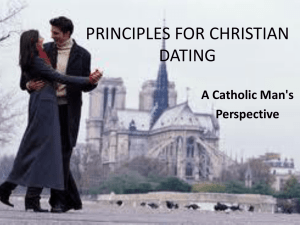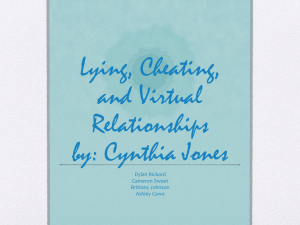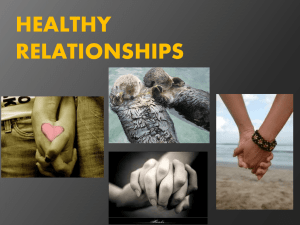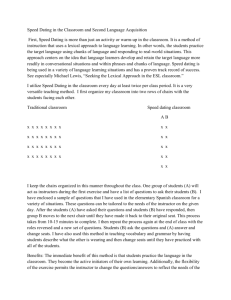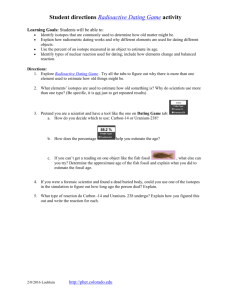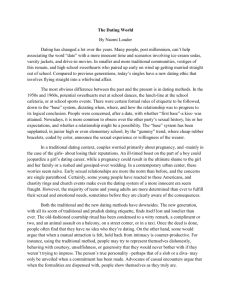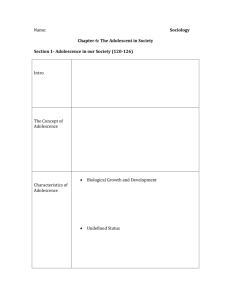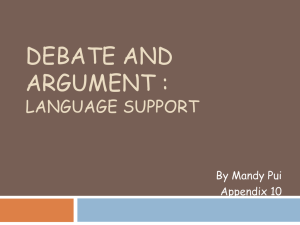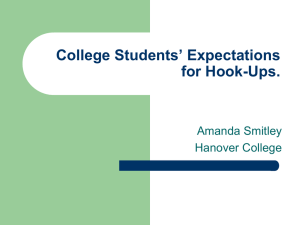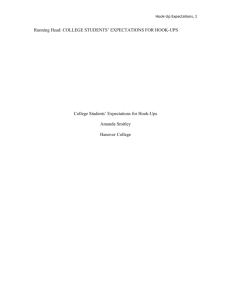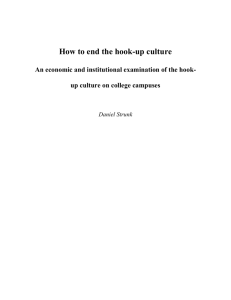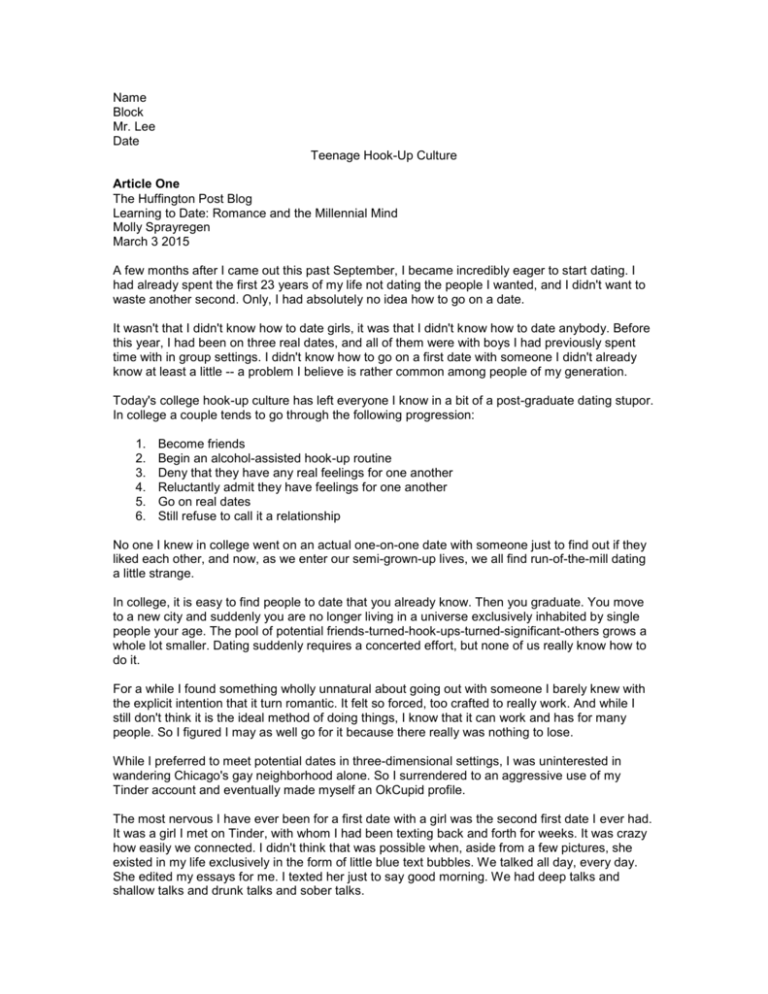
Name
Block
Mr. Lee
Date
Teenage Hook-Up Culture
Article One
The Huffington Post Blog
Learning to Date: Romance and the Millennial Mind
Molly Sprayregen
March 3 2015
A few months after I came out this past September, I became incredibly eager to start dating. I
had already spent the first 23 years of my life not dating the people I wanted, and I didn't want to
waste another second. Only, I had absolutely no idea how to go on a date.
It wasn't that I didn't know how to date girls, it was that I didn't know how to date anybody. Before
this year, I had been on three real dates, and all of them were with boys I had previously spent
time with in group settings. I didn't know how to go on a first date with someone I didn't already
know at least a little -- a problem I believe is rather common among people of my generation.
Today's college hook-up culture has left everyone I know in a bit of a post-graduate dating stupor.
In college a couple tends to go through the following progression:
1.
2.
3.
4.
5.
6.
Become friends
Begin an alcohol-assisted hook-up routine
Deny that they have any real feelings for one another
Reluctantly admit they have feelings for one another
Go on real dates
Still refuse to call it a relationship
No one I knew in college went on an actual one-on-one date with someone just to find out if they
liked each other, and now, as we enter our semi-grown-up lives, we all find run-of-the-mill dating
a little strange.
In college, it is easy to find people to date that you already know. Then you graduate. You move
to a new city and suddenly you are no longer living in a universe exclusively inhabited by single
people your age. The pool of potential friends-turned-hook-ups-turned-significant-others grows a
whole lot smaller. Dating suddenly requires a concerted effort, but none of us really know how to
do it.
For a while I found something wholly unnatural about going out with someone I barely knew with
the explicit intention that it turn romantic. It felt so forced, too crafted to really work. And while I
still don't think it is the ideal method of doing things, I know that it can work and has for many
people. So I figured I may as well go for it because there really was nothing to lose.
While I preferred to meet potential dates in three-dimensional settings, I was uninterested in
wandering Chicago's gay neighborhood alone. So I surrendered to an aggressive use of my
Tinder account and eventually made myself an OkCupid profile.
The most nervous I have ever been for a first date with a girl was the second first date I ever had.
It was a girl I met on Tinder, with whom I had been texting back and forth for weeks. It was crazy
how easily we connected. I didn't think that was possible when, aside from a few pictures, she
existed in my life exclusively in the form of little blue text bubbles. We talked all day, every day.
She edited my essays for me. I texted her just to say good morning. We had deep talks and
shallow talks and drunk talks and sober talks.
We were both new to Tinder, so I don't think we realized how crazy long it took for us to finally
decide to meet. Eventually we did make a plan, though. I got to the restaurant very early, so I
aimlessly wandered the aisles of the CVS next door, hoping she wasn't early, too, because an
awkward pre-date run-in in the toothpaste section was the last thing my boomeranging brain
needed to deal with. What do you talk about on a first date? Do I hug her when she gets here?
Do we kiss at the end? How much is okay to drink? I hope a lot. Do I pay since I did the asking?
Do we split it? Do we acknowledge deep things we've discussed or pretend like it's an actual first
date where we don't actually know each other well enough to do that? What if the chemistry
doesn't translate in person?
It is so strange how the lines have blurred regarding what it means to be meeting for the first time.
In so many ways I knew her so well, yet I really didn't know her at all.
Predictably, as she was a fellow recent-grad, she also found the whole dating concept rather
uncomfortable, having just ended a college relationship in which, surprise surprise, she dated her
best friend. I could tell by the way she was fidgeting that she was even more uncomfortable than I
was, and I knew I would never see her again.
It's sad how such a strong virtual connection can fizzle so quickly in the physical world, but even
though it didn't work out, that girl was a very important step for me. She was the first time I
believed that there was someone else out there that could make me happy besides the first girl
who broke my heart. She was the first time I realized I was capable of liking, and maybe someday
loving, someone else.
I've learned a lot of things through these first few months of dating. I've learned, for instance, that
coffee dates are a bad idea because there is no clear end. You finish your coffee within the first
twenty minutes, and then you just chat and chat and chat until one person finally makes up an
excuse for why they have to go. Even dates that go really well have to end sometime, and coffee
does not provide any sort of convenient way to wrap things up.
I have also learned that sometimes someone you like a lot who seems to be having a wonderful
time with you can for an inexplicable reason never want to see you again. It isn't worth trying to
figure out why. Accept that you will never know.
I was also surprised to discover how common it is to discuss past relationships or heartbreaks. I
thought it was incredibly taboo, but I've learned people like being open and like hearing where
you're coming from.
I am no longer afraid to go on first dates. Do I love them? No, I don't know anyone who does. But
do I mind them? Not at all. The way I see it, the worst possible scenario is a slightly awkward
hour or two and the best is a new girlfriend. There is really only something to gain, and those few
people that do become second, third, and fourth dates are well worth sifting through the rest.
Besides, it is never difficult to find common ground with another girl around my age. Whether
there are sparks is another thing, but we can always find something to talk about, especially when
we can always fall back on what gay people love to chat about on dates: being gay. No matter
who you're meeting, there is already a mutual understanding there, a connection because you
know you each have experienced similar hurdles.
I try to go on as many dates as I can now because I believe it never hurts to give someone a
chance. Someone as intent on getting out there as I am, after all, should be dating with an open
mind.
The only way to learn how to date, it turns out, is to do it, and to comfort yourself by knowing that
the person across from you probably has no idea what she's doing either. You have to learn to
make the right choices by making the wrong choices, figure out how to say the right things by
saying the wrong ones. You just have to keep putting yourself out there and allow yourself to be a
little bit vulnerable. I wholeheartedly believe it will pay off in the long run.
Article Two
The Huffington Post Blog
The Hookup Generation
Patricia Vanderbilt
Feb 27 2012
I'm apparently part of the "hook-up generation." In pop culture, the media and even sociology
studies, there's an ongoing discussion about college students' preference for casual sex and the
effect of hooking up on our ability to form personal relationships.
At Whitman, the so-called hook-up culture is an established norm -- to shorten an already short
story, romantic entanglements at this school tend to start with alcohol and grinding in a dimly lit
basement... and end with some juicy new gossip to share at brunch the next morning. One-night
stands. Nothing particularly creative or unusual about the way they happen at Whitman.
The flip side of the hook-up culture is rarely discussed. When short-term flings are the expected
mode of sexual interaction, we tend to regard other, more slow-paced forms of romance as
abnormal. A girl asking a guy out? Weird -- not because of gendered social norms, but because
going out on dates before hooking up is weird. If a student met someone he is attracted to at the
dining hall, talked to her through lunch and thought that he might want to spend more time with
her, he probably wouldn't ask for her number. More likely? He'd hope to catch sight of her at a frat
party that coming weekend.
This Whitman-style romance is fulfilling for many, but it leaves out those who are uncomfortable
with the idea of sexual encounters coming in single installments. Hook-up culture creates a
strange binary: on the one hand, students are having casual sex. On the other hand, students are
having no sex at all. With the exception of an occasional long-term relationship, there is virtually
nothing in-between.
I've talked primarily to women about their unwanted sex-less lives, but I suspect that there are
many men who can also relate. When these students came to college, they were excited about
the opportunity to meet people and have their first adult relationship. But due to the whims of fate
and Whitman's gender ratio (nearly 60% female), it didn't happen. They went to parties, drank
cheap beer from red cups and occasionally made out with someone on the dance floor. And
that's where things usually stopped, because the thought of their first sexual experience being
with someone to whom they had barely spoken made them balk.
Why -- if many aren't comfortable with casual hook-ups -- are we unable to say to that cute girl at
the library, "Nice shoes. Wanna talk?" Somewhere, we seem to have lost our ability to indicate
romantic interest in a person without the help of PBR. We resort to non-verbal communication.
We're also image-conscious and self-absorbed. It's hard not to be; we showcase our amazing
lives via Facebook and judge our peers by the way that they present themselves online. We're
also taught in class to analyze every word. As a result, we are terrified of sounding pretentious,
ethnocentric, heteronormative, orientalist or anything else that is insensitive, not politically correct
or just plain stupid. It's a wonder that we find anything to talk about at all.
The hook-up is an attractive option when we consider these anxieties. We don't have to prove our
intelligence our our sense of humor. There's something safe about this anonymity (though at a
school of 1,596, nothing is really anonymous). Most would say that casual sex is pleasurable;
some call it liberating. But those in Kelly Clarkson's camp who do not hook-up will probably not
have much of an opportunity to take it slow either.
Article Three
The New York Times
The Myth of Rampant Teenage Promiscuity
Tara Parker-Pope
Jan 26 2009
Have American teenagers gone wild?
Parents have worried for generations about changing moral values and risky behavior among
young people, and the latest news seems particularly worrisome.
It came from the National Center for Health Statistics, which reported this month that births to 15to 19-year-olds had risen for the first time in more than a decade.
And that is not the only alarm being sounded. The talk show host Tyra Banks declared a teen sex
crisis last fall after her show surveyed girls about sexual behavior. A few years ago, Oprah
Winfrey warned parents of a teenage oral-sex epidemic.
The news is troubling, but it’s also misleading. While some young people are clearly engaging in
risky sexual behavior, a vast majority are not. The reality is that in many ways, today’s teenagers
are more conservative about sex than previous generations.
Today, fewer than half of all high school students have had sex: 47.8 percent as of 2007,
according to the National Youth Risk Behavior Survey, down from 54.1 percent in 1991.
A less recent report suggests that teenagers are also waiting longer to have sex than they did in
the past. A 2002 report from the Department of Health and Human Services found that 30 percent
of 15- to 17-year-old girls had experienced sex, down from 38 percent in 1995. During the same
period, the percentage of sexually experienced boys in that age group dropped to 31 percent
from 43 percent.
The rates also went down among younger teenagers. In 1995, about 20 percent said they had
had sex before age 15, but by 2002 those numbers had dropped to 13 percent of girls and 15
percent of boys.
“There’s no doubt that the public perception is that things are getting worse, and that kids are
having sex younger and are much wilder than they ever were,” said Kathleen A. Bogle, an
assistant professor of sociology and criminal justice at La Salle University. “But when you look at
the data, that’s not the case.”
One reason people misconstrue teenage sexual behavior is that the system of dating and
relationships has changed significantly. In the first half of the 20th century, dating was planned
and structured — and a date might or might not lead to a physical relationship. In recent decades,
that pattern has largely been replaced by casual gatherings of teenagers.
In that setting, teenagers often say they “fool around,” and in a reversal of the old pattern, such
an encounter may or may not lead to regular dating. The shift began around the late 1960s, said
Dr. Bogle, who explored the trend in her book “Hooking Up: Sex, Dating and Relationships on
Campus” (N.Y.U. Press, 2008).
The latest rise in teenage pregnancy rates is cause for concern. But it very likely reflects
changing patterns in contraceptive use rather than a major change in sexual behavior. The reality
is that the rate of teenage childbearing has fallen steeply since the late 1950s. The declines aren’t
explained by the increasing availability of abortions: teenage abortion rates have also dropped.
“There is a group of kids who engage in sexual behavior, but it’s not really significantly different
than previous generations,” said Maria Kefalas, an associate professor of sociology at St.
Joseph’s University in Philadelphia and co-author of “Promises I Can Keep: Why Poor Women
Put Motherhood Before Marriage” (University of California Press, 2005). “This creeping up of teen
pregnancy is not because so many more kids are having sex, but most likely because more kids
aren’t using contraception.”
As for that supposed epidemic of oral sex, especially among younger teenagers: national
statistics on the behavior have only recently been collected, and they are not as alarming as
some reports would have you believe. About 16 percent of teenagers say they have had oral sex
but haven’t yet had intercourse. Researchers say children’s more relaxed attitude about oral sex
probably reflects a similar change among adults since the 1950s. In addition, some teenagers
may view oral sex as “safer,” since unplanned pregnancy is not an issue.
Health researchers say parents who fret about teenage sex often fail to focus on the important
lessons they can learn from the kids who aren’t having sex. Teenagers with more parental
supervision, who come from two-parent households and who are doing well in school are more
likely to delay sex until their late teens or beyond.
“For teens, sex requires time and lack of supervision,” Dr. Kefalas said. “What’s really important
for us to pay attention to, as researchers and as parents, are the characteristics of the kids who
become pregnant and those who get sexually transmitted diseases.
“This whole moral panic thing misses the point, because research suggests kids who don’t use
contraception tend to be kids who are feeling lost and disconnected and not doing well.”
Although the data is clear, health researchers say it is often hard to convince adults that most
teenagers have healthy attitudes about sex.
“I give presentations nationwide where I’m showing people that the virginity rate in college is
higher than you think and the number of partners is lower than you think and hooking up more
often than not does not mean intercourse,” Dr. Bogle said. “But so many people think we’re
morally in trouble, in a downward spiral and teens are out of control. It’s very difficult to convince
people otherwise.”


